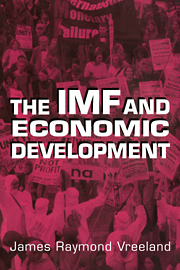Book contents
- Frontmatter
- Contents
- List of Tables and Figures
- Acknowledgements
- 1 Introduction
- 2 Analytically Significant Cases
- 3 An Analytical Approach to the Politics of IMF Agreements
- 4 Testing the Selection Story
- 5 The Effect of IMF Programs on Economic Growth
- 6 Distributional Consequences of IMF Programs
- 7 Conclusions
- Appendix 1 Variables Used in This Study
- Appendix 2 Country-Years in Samples
- References
- Index
2 - Analytically Significant Cases
Published online by Cambridge University Press: 08 January 2010
- Frontmatter
- Contents
- List of Tables and Figures
- Acknowledgements
- 1 Introduction
- 2 Analytically Significant Cases
- 3 An Analytical Approach to the Politics of IMF Agreements
- 4 Testing the Selection Story
- 5 The Effect of IMF Programs on Economic Growth
- 6 Distributional Consequences of IMF Programs
- 7 Conclusions
- Appendix 1 Variables Used in This Study
- Appendix 2 Country-Years in Samples
- References
- Index
Summary
How should cases be selected? Exciting stories about new IMF agreements unfold every week. When I first drafted this chapter in 1999, IMF agreements with Russia, Brazil, Korea, and Indonesia filled the headlines. As I revise this chapter in 2001, agreements with Argentina, Turkey, Kenya, and Guatemala have emerged as top stories. From all the hundreds of IMF agreements that have been signed in all the regions of the world, how does one select a few instances to provide insight on the question of selection?
Note that a few anecdotes do not amount to much. To control for selection when estimating the effects of IMF programs, a general, systematic story of selection is required. But even though the ultimate test of the selection story will be a statistical one, one may gain greater insight to the process of IMF participation by selecting particular types of cases.
If one were starting from scratch, one might want to start with a case selected randomly, to find the most typical characteristics of participating countries. But one does not have to start from scratch regarding IMF participation. The conventional story of participation is that governments turn to the Fund when they need an IMF loan. This assumption has led researchers to consider the economic determinants of IMF participation. As Chapter 1 describes, there is some consensus about the economic determinants of IMF programs, but disagreement over some key factors remains.
- Type
- Chapter
- Information
- The IMF and Economic Development , pp. 20 - 52Publisher: Cambridge University PressPrint publication year: 2003



